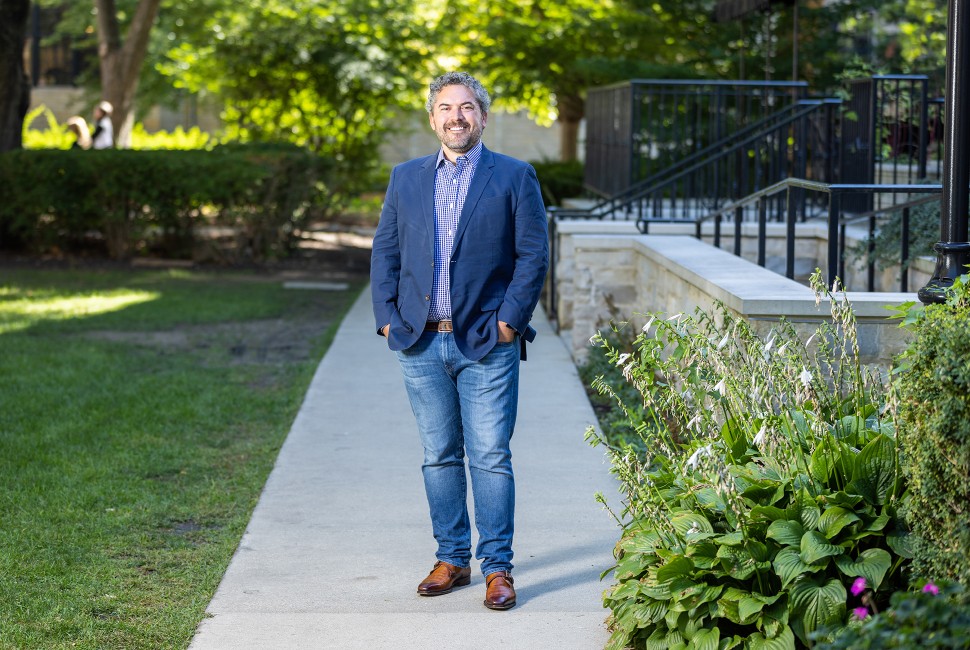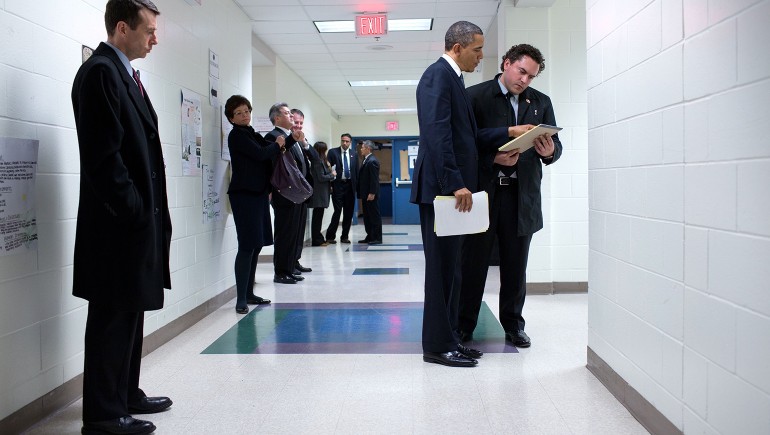Northwestern alumnus Cody Keenan ’02 isn’t psychic — and that’s probably for the best.
If, on June 17, 2015, he knew what the next 10 days held in store, he might have been overwhelmed by the pressure. The dramatic week-and-a-half stretch began with a mass shooting in a Charleston, South Carolina, church and ended with two landmark Supreme Court decisions that changed American life forever. As President Barack Obama’s chief speechwriter, Keenan was in charge of writing speeches, statements and a heart-wrenching eulogy, all in response to the deluge of historic events.
“Luckily, I didn’t have the benefit of foresight,” Keenan said. “I wasn’t burdened by the knowledge of what was coming or how the Supreme Court would rule on marriage equality and the Affordable Care Act. We grappled with these events in real time, just like everyone else.”
Keenan shares his memories of those fateful, fleeting days in his new book “Grace: President Obama and Ten Days in the Battle for America.” The gripping account is so engrossing that readers will forget they already know the outcome of these events. Instead, Keenan creates a wholly immersive narrative that pulls readers into the whirlwind, as hours collapse into seconds and intense pressure reaches a fever pitch.
Now a member of the Northwestern faculty, Keenan teaches a course on speechwriting at the Weinberg College of Arts and Sciences. He will participate in two upcoming campus events — a virtual talk on Tuesday, Sept. 27 and an in-person appearance Friday, Oct. 7, during Homecoming and Reunion Weekend — to reflect on his past experience and share stories from the book, which comes out on Oct. 4.
> Related: Learning to write like a president sounds
Keenan talked to Northwestern Now about writing under pressure, the art of penning a great speech and the importance of embracing empathy to reach diverse audiences.
It has been seven years since those events. Why did you write this book now?
I still worked for President Obama until early 2021, so I had ethical concerns over writing a book that was largely about him while still on his payroll. But I posted a Twitter thread on the second anniversary of the Supreme Court’s decision on marriage equality (Obergefell v. Hodges). I wanted to show America at its best and remind people what this country is capable of. My “tweetstorm” sort of took off, and I realized there might be a book in all of this.
After writing speeches in Obama’s voice for so long, was it difficult to pivot to your own?
After writing for Obama for so many years, I adopted parts of his worldview. But we have very different writing styles. In general, speechwriting is quite different from writing a book. With speechwriting, you’re writing for the ear, so it needs to be more colloquial. The audience isn’t able to read along with you. You want to keep sentences shorter, so they are easier for the speaker. You also have to add tips and tricks to keep your audience’s attention. Even just adding phrases like “Listen up” or “Now, this is important.” It might sound silly or weird to write that way, but it helps grab attention. In my own writing, I’m a little more blunt. But I can afford to be blunt in ways the president could not.
You had to confront the concept of race after the white supremacist attack in Charleston. As a white man, how did you handle that?
On the outside, Obama and I couldn’t be much more different. But we share a worldview, and that made it easier to get into his head and imagine what he would say if he had the time. That’s easier with policy speeches. With topics surrounding race, it was always tough.
The most important thing about speechwriting — besides being able to string sentences together — is having a sense of empathy. You have to understand your audience and try walking in their shoes. But there are limits to empathy, in terms of imagination. I’ve never been racially profiled, asked for my ID or had to have a conversation with my child about what to do when a police officer approaches you. For speeches like that, I needed more time with Obama before I got started. Ultimately, they’re his words — not mine. Speechwriters are never putting their own views into a speech. So, I tried to get as much guidance from him as I could before beginning. That helped a lot.



